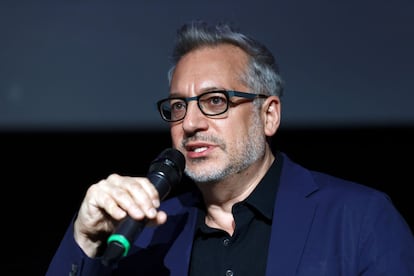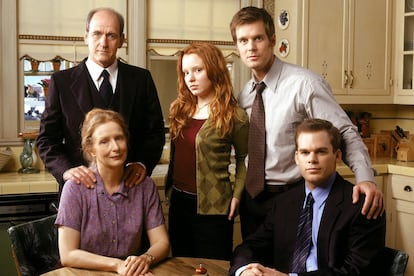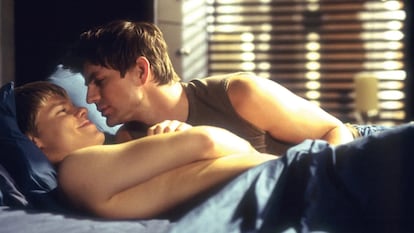Jeremy Podesewa, the low-profile television legend who has inherited the legacy of ‘Blade Runner’
The director’s new project is ‘Blade Runner 2099,’ the Prime Video miniseries that extends the famous franchise which was brought to life by Ridley Scott


Few viewers would recognize 61-year-old Jeremy Podeswa upon seeing his face. However, many would be able to identify the Toronto-born director’s name, after having seen it next to countless credits. Although directors tend to live in the background, the Canadian has managed to become a television icon from behind the cameras. He’s achieved this by participating in some of the key fictional series of recent history. Podeswa is one of the pioneers of the 21st century’s series fever, having directed episodes of Six Feet Under and Boardwalk Empire during HBO’s golden age, as well as episodes of Showtime’s version of Queer as Folk. Those responsible for Game of Thrones counted on his experience to take charge of some of its most important and anticipated episodes. The one about the revelation of Jon Snow’s identity at the end of season seven bears his name.
Ridley Scott has now trusted the Canadian with one of his most respected sagas. Podeswa will direct the first episode of the miniseries Blade Runner 2099, which will premiere on Prime Video in the near future. Podeswa will also be one of the executive producers.
When he met with Scott, the script for that first chapter had already been written, while those for the rest of the episodes were somewhat underway. This was what the Canadian director told EL PAÍS in November, during the Thessaloniki Film Festival in Greece. He was offering a masterclass at the festival dedicated to television.
Scott told Podeswa that he wouldn’t be able to record the pilot, as his schedule was busy with the sequel to Gladiator. Hence, he passed along the baton. The story will serve as a sequel to the classic — which starred Harrison Ford in the 1980s — and Blade Runner 2049, starring Ryan Gosling and directed by Denis Villeneuve. “We’re going to maintain the essence of the original film. It’s one of the things Ridley and I talked about from the beginning,” Podeswa revealed to EL PAÍS. “Although [he’s not] very strict on issues such as esthetics and style, either. He’s open to change,” the director warned.
Filming is set to begin in the spring of 2024. “The problems that the use of artificial intelligence poses to humans will continue to be present in the plots,” Podeswa added. He has assured the public that he will do his best to keep alive the “brilliant game between past and future” that Scott captured in his 1982 feature film.

The Canadian director understands Blade Runner as “one of those stories that has raised universal and timeless questions and that has built its own universe, as happened with Star Wars. That’s why it can be adapted to so many formats.” In recent years, several short films and even an animated series have turned Philip K. Dick’s science fiction short story into a fruitful franchise. “The dilemma he posed, at the time, was quite new. And it’s also an issue that has continued [to gain relevance]. What was once an abstract idea is now a reality for viewers,” Podeswa notes.
Seminal television
The director admits that, while recording the first season of Six Feet Under in 2001, he knew that a special series was going to be born, different from the rest. But he never imagined that it would be so seminal and influential for other creators, and for so long. “It was clear that it was top-notch television. The scripts were beautiful, lucid and fun. The cast was perfect and the visual style impeccable,” he recalls. “What I didn’t know was that something that demanded so much from the viewer was going to be so well accepted by critics and the audience.” The Canadian explains that he noticed this even in his personal life. “It was the first time that I saw the people around me gather in a house every week to watch the new episode of a series.”

Something similar happened, in another context, when he was in charge of launching the American version of Queer as Folk, the first production that put the gay perspective at the center of the story before a global audience. “I saw the British original by Russell T. Davies and it was so explicit… my head exploded. He was truly progressive. On the one hand, we had the advantage of already having a direct reference when it came to making history on American television. On the other hand, we had to do it in a society very different from that of Europe. The sex scenes, for example, were very different. In our case, the mere fact that we filmed them was already a political act,” he affirms.
Often, directors have to soak up the already defined identity of a series to take charge of just one episode. “It’s a somewhat thankless but well-paid profession,” Podeswa acknowledges. Proof of this is that the Directors Guild also renegotiated its contract this year to adjust salaries and labor rights but — unlike the screenwriters and actors — the directors didn’t go on strike, as they considered these improvements to be satisfactory. “The issue of artificial intelligence affects [the actors and screenwriters] much more directly. And it was something that had to be defined,” Podeswa says.

Jeremy Podeswa is used to his job being to jump on a moving train that’s already well-oiled. Precisely, one of the most complicated moments he remembers from his career coincides with one of the most pleasant as a viewer: watching the pilot episode of Boardwalk Empire — directed by Martin Scorsese — in a private screening. “He’s a genius who shot his episode in more than a month, with a very high budget,” Podeswa recalls. “Timothy Van Patten and I were in charge of the following chapters. We had to record each one of them in 10 days and with much less money. When we saw that marvellous thing that Scorsese had done, we looked at each other and said: ‘We’re screwed.’”
Sign up for our weekly newsletter to get more English-language news coverage from EL PAÍS USA Edition
Tu suscripción se está usando en otro dispositivo
¿Quieres añadir otro usuario a tu suscripción?
Si continúas leyendo en este dispositivo, no se podrá leer en el otro.
FlechaTu suscripción se está usando en otro dispositivo y solo puedes acceder a EL PAÍS desde un dispositivo a la vez.
Si quieres compartir tu cuenta, cambia tu suscripción a la modalidad Premium, así podrás añadir otro usuario. Cada uno accederá con su propia cuenta de email, lo que os permitirá personalizar vuestra experiencia en EL PAÍS.
¿Tienes una suscripción de empresa? Accede aquí para contratar más cuentas.
En el caso de no saber quién está usando tu cuenta, te recomendamos cambiar tu contraseña aquí.
Si decides continuar compartiendo tu cuenta, este mensaje se mostrará en tu dispositivo y en el de la otra persona que está usando tu cuenta de forma indefinida, afectando a tu experiencia de lectura. Puedes consultar aquí los términos y condiciones de la suscripción digital.








































